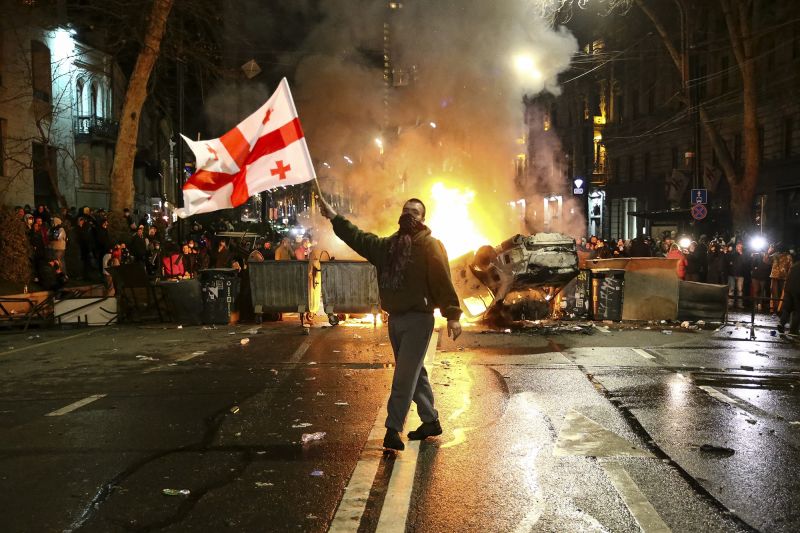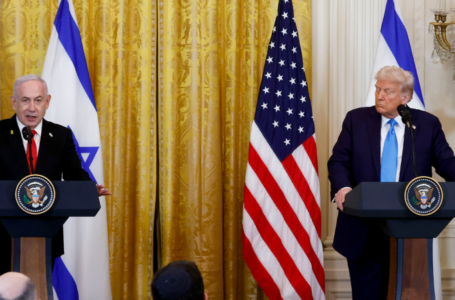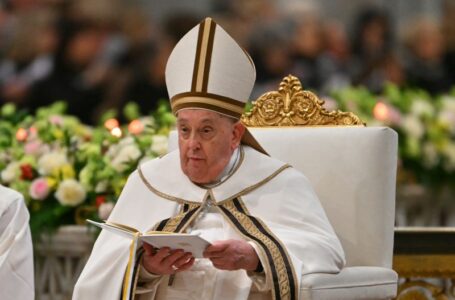White South Africans gather in support of Trump and his claims that they are victims of racism
As Georgia slides into authoritarianism, protesters vow to keep fighting Russian pivot


Two years ago, two days of protests were enough to force Georgia’s government into an embarrassing U-turn. It had tried to introduce a “foreign agents” bill – which critics likened to legislation passed by President Vladimir Putin to stifle dissent in Russia – but backed down after fierce demonstrations sparked by the bill’s first reading.
“We fought it off like hell, used every instrument at our disposal,” recalls Ana Tavazde, one of tens of thousands who demonstrated against the bill, which would have forced media and other organizations receiving more than 20% of their funding from abroad to register as “agents of foreign influence” or be fined.
But the protesters’ victory was short-lived. The government revived the bill last year – and this time would not back down. The parliament approved it in May, despite huge opposition on the streets.
After the ruling Georgian Dream party – which declared victory anew after a disputed election in October – delayed the country’s long-awaited European Union membership bid until 2028, Tavazde was one of thousands of Georgians to take to the streets once again. The government invested in water cannons, according to local media reports, and started making mass arrests.
Since then, Georgia’s government has shown little sign of shifting its course, which many in the former Soviet country feel is taking the country back into the Kremlin’s orbit. And with the protest movement now approaching its third month, it is not clear what can break the stalemate.
Multiple opposition politicians have been publicly beaten, some in broad daylight. Hundreds of protesters have been arrested, of whom more than 300 allege suffering beatings, torture and other ill-treatment at the hands of law enforcement, according to Amnesty International. The police’s presence at rallies has been bolstered by masked men, who do not wear uniforms displaying their department and rank.
Extreme measures
“Today, almost a year later, you would say this has become a really nasty authoritarian regime.”
Pro-Western Salome Zourabichvili, who described the elections as “rigged” and called on Georgians to protest in October, was replaced as president by far-right former soccer star Mikheil Kavelashvili in mid-December. The government imposed further restrictions on freedom of assembly at the end of the year.
At the start of February, it proposed more extreme measures that would increase detention periods and fines for certain offenses, such as disorderly conduct or disobeying law enforcement officers, and limit the areas in which protests can be held, local outlet OC Media reported.
On February 5, the party announced it would be introducing unspecified laws targeted at the media and civil society and expelled 49 opposition MPs from Parliament. Three Georgian Dream MPs resigned, supposedly to form a new “healthy opposition ” – with the approval of the ruling party’s parliamentary speaker. On the same day, the prime minister called for “a sort of Nuremburg trial” to investigate the rule of UNM, the opposition party which governed from 2003 to 2012. The Georgian government has been approached for comment, but did not respond.
Journalist Mzia Amaglobeli is facing up to seven years in prison if convicted of assaulting a police officer. The founder of two independent publications, Batumelebi and Netgazeti, she was detained after allegedly slapping a police officer at a protest last month. The European Parliament has claimed Amaglobeli was “unlawfully arrested” and that the charges against her are “politically motivated.”
Soon after her detention, Amaglobeli started a hunger strike, which she has now been on for 34 days, to demand her release. When asked on February 4 how Amaglobeli’s hunger strike could end, Georgian Dream’s chairman said: “Hunger usually leads to death.”
The International Federation of Journalists has urged the Georgian government to “release Amaglobeli immediately and to stop its crackdown on journalists and independent media.”
Staying on the winning side
For many in this ex-Soviet country, the idea of pivoting towards Russia – which invaded in 2008 and continues to occupy 20% of Georgia’s territory – is unthinkable. Over 80% support EU membership, according to polls, and every party’s campaign platform for the October election included the pursuit of EU membership. Campaign posters for Georgian Dream even merged its logo with the gold stars of the EU flag.
So why has the government turned away from such a popular policy?
“I think he just kind of assumes that Moscow is going to win this war,” Mitchell added, referring to Bidzina Ivanishvili, Georgian Dream’s founder and honorary chairman.
“And he’s going to stay on the winning side.”
Bidzina Ivanishvili made his fortune in the years following the collapse of the Soviet Union in Russia in the 1990s and is estimated by Bloomberg to be worth $7.7 billion – a quarter of Georgia’s GDP in 2023. Protesters, some of whom have donned masks of his face at protests, see him as pushing Moscow’s agenda in this ex-Soviet country despite no longer holding any elected position.
Chugoshvili was one of several Georgian Dream politicians who resigned in 2019 after the parliament did not pass an amendment which would have made the electoral system fully proportional. “It was obvious that (Georgian Dream) was becoming obsessed with control,” said Chugoshvili, who co-founded Egeria Solutions, an NGO which has worked on European integration projects, after leaving the party.
“Georgian Dream and Bidzina plan to stay in power for ever. And they cannot do this while integrating into the EU and NATO.”
“Some local outlets are totally funded by USAID or affiliated organisations,” said Ostiller.
“They have no back-up, no savings. They will close, and if funding returns, reopening them will be far more difficult.”
Culture war rhetoric
In a country where the conservative Georgian Orthodox Church exerts massive influence, Ivanishvili has also leaned into “culture war” politics, observers say.
The results of last year’s elections, in which Georgian Dream claimed to receive about 54% of the vote, have been widely disputed; however, the party undoubtedly still has some support.
“It’s probably got a solid 35 to 45%,” Mitchell estimated. “They’re popular enough that they still have a base.”
But for a younger generation, who have only known Georgia as committed to EU and NATO membership and Russia as a threat, the anti-Western rhetoric doesn’t seem to land, and the government’s moves towards authoritarianism don’t seem to inspire fear. Protests are continuing into their third month.
Since protests broke out on November 28, Keren Esebua has been on the streets almost every night in Zugdidi – a city located just 60 kilometres (37 miles) from Abkhazia, a breakaway Georgian region occupied by Russia since 2008.
“I lost my home in Sukhumi, in Abkhazia, in 1993. And I was here in Zugdidi, blocking the way for Russian troops in 2008 when I was 19.
“I’m not giving Russia any kind of opportunity to swallow up Georgia again.”











